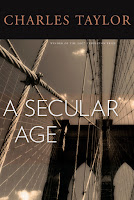"Again, this doesn't mean that everyone will go on being pulled both ways. Many, perhaps most, will end up opting for some solution, including the extreme ones of authoritarian orthodoxy and materialist atheism. But the situation as a whole remains unstable, in the sense that there is no long term movement towards a [permanent] resolution of whatever kind. Successive generations keep re-opening the issues in new ways; children desert the solutions of their parents: one generation reacts to the Gibbonian high culture of the eighteenth century by turning evangelical; not very long after their descendants have become unbelievers, and so on. Both those who hope that unbelief will encounter its own limitations and aridity, and will peter out in a general return to orthodoxy; and those who think that all this represents an historic march towards reason and science, seem doomed to disappointment. Over time, there seems no stable resolution."
Charles Taylor, A secular age (Cambridge, MA: The Belknap Press of Harvard University, 2007), 302-303. Not surprisingly, I'm disinclined to think that the two poles can be equally attractive over the truly long haul in fact.


No comments:
Post a Comment